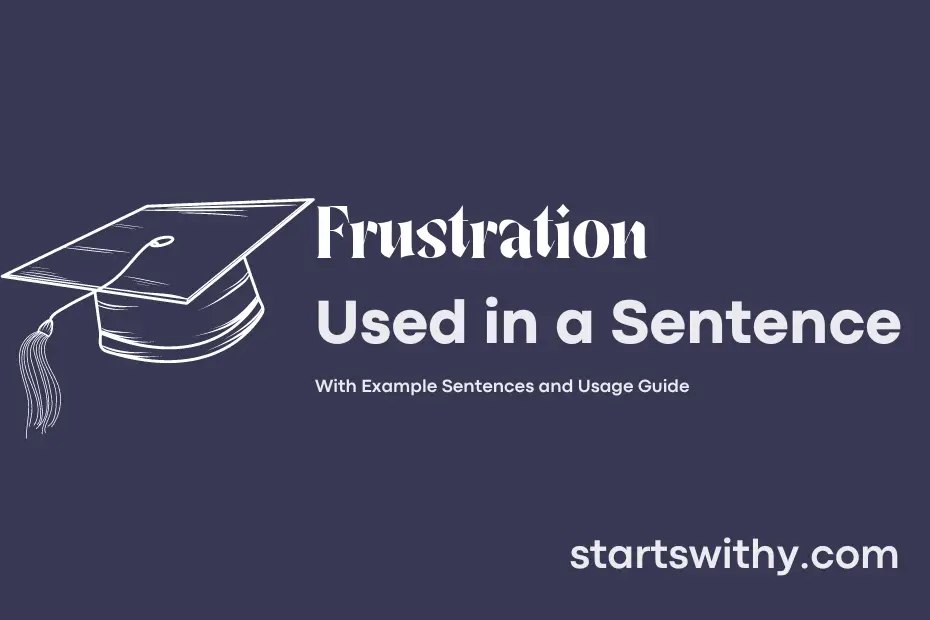Have you ever felt the intense emotion of frustration? Frustration is the feeling of being upset or annoyed when obstacles block your progress or goals. This common experience can arise from situations that don’t go as planned or when expectations are not met.
7 Examples Of Frustration Used In a Sentence For Kids
- I felt frustration when I couldn’t tie my shoelaces.
- Frustration crept in when my crayon broke while drawing.
- I showed frustration when I couldn’t reach my favorite toy.
- Frustration bubbled up when I couldn’t get the puzzle pieces to fit.
- I felt frustration when my friend took my turn on the swing.
- Frustration came over me when I couldn’t find my favorite book.
- I felt frustration when my kite got stuck in a tree.
14 Sentences with Frustration Examples
- Frustration sets in when you have to wait in long queues for hours to pay fees at the college.
- Trying to concentrate on studies becomes a challenge when distractions lead to frustration.
- The feeling of frustration arises when you struggle to understand complex topics in lectures.
- Group projects can sometimes lead to frustration due to conflicting opinions and lack of coordination.
- Frustration kicks in when technical issues prevent you from submitting assignments on time.
- Juggling between multiple deadlines can result in a sense of frustration and overwhelm.
- The lack of availability of study materials can cause frustration among college students.
- Feeling lost in a sea of information during exams can lead to frustration and anxiety.
- Continuous disruptions during online classes can contribute to a sense of frustration among students.
- The pressure to excel in academics can result in feelings of frustration and self-doubt.
- Frustration can arise when the library is overcrowded and finding a quiet spot to study becomes impossible.
- Being unable to reach out to professors for clarifications can lead to frustration in understanding course material.
- The constant changes in the college schedule can cause frustration for students trying to plan their studies.
- Missing out on important extracurricular activities due to academic commitments can lead to feelings of frustration and disappointment.
How To Use Frustration in Sentences?
Frustration can be used in a sentence to describe a feeling of annoyance or disappointment. Here’s a guide on how to use it correctly:
-
Subject + Feelings: Begin by identifying the person or thing experiencing the feeling of frustration. For example, “I felt frustration when my computer crashed.”
-
Action + Cause: Describe the action or situation that led to the feeling of frustration. For instance, “Her constant interruptions caused me great frustration during the meeting.”
-
Conjunctions: Use words like “because” or “due to” to connect the feeling with its cause. For example, “She missed the deadline due to her own frustration with the project.”
-
Context: Provide context to help clarify the feeling. “Despite his best efforts, he couldn’t hide his frustration with the slow progress.”
-
Reaction: Show how the feeling of frustration influences behavior or thoughts. “His loud sighs were a clear sign of his mounting frustration.”
-
Resolution: In some cases, you can mention how the person resolves or copes with the feeling of frustration. “She took a deep breath to calm her frustration before responding.”
By following these steps, you can effectively use the word frustration in a sentence to convey feelings of irritation or disappointment.
Conclusion
In conclusion, frustration can arise when we are faced with obstacles, delays, or challenges that prevent us from achieving our goals or desired outcomes. It is a common emotion that can lead to feelings of anger, impatience, and dissatisfaction. The examples of sentences with frustration illustrate how this emotion can manifest in different situations, whether it’s experiencing technical difficulties, dealing with incompetence, or feeling overwhelmed by a lack of progress.
When we experience frustration, it’s important to acknowledge and address the underlying causes to prevent it from escalating further. By practicing patience, problem-solving, and seeking support when needed, we can better navigate frustrating circumstances and work towards finding solutions. Ultimately, understanding and managing frustrations can lead to better resilience, problem-solving skills, and a more positive outlook in challenging situations.



